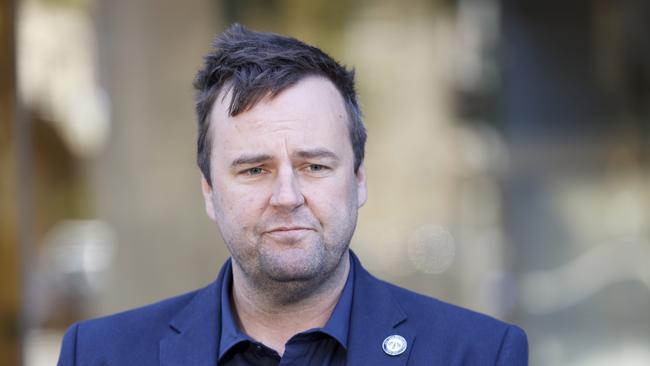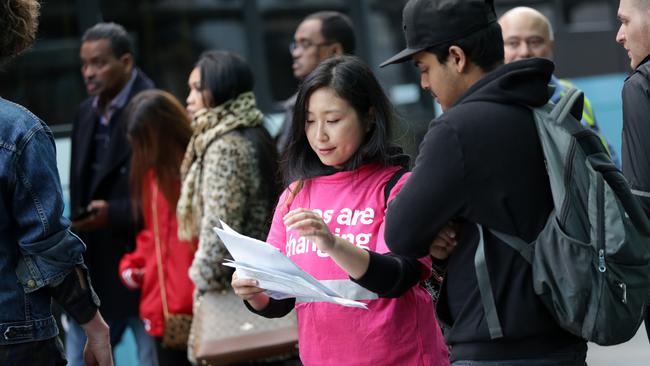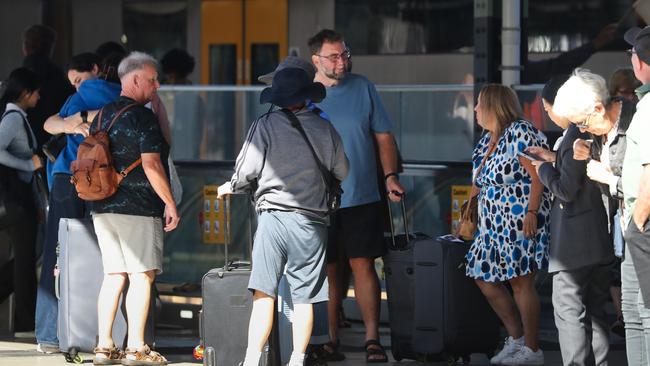James O’Doherty: How the RTBU’s attempts to hold the city to ransom went off the rails
In pushing the wages dispute to breaking point, the RTBU has now lost all bargaining power it may have had to secure a better deal, writes James O’Doherty
Opinion
Don't miss out on the headlines from Opinion. Followed categories will be added to My News.
With the rail network in meltdown last Friday, a 21- year-old office worker was reduced to tears in her office because she had no way of getting back home to Campbelltown.
The Health Services Union worker was one of millions of Sydneysiders who had been left stranded when rail union members refused to turn up to work, crippling the train system.
While working to improve conditions for frontline health staff, the HSU employee had been abandoned by her own union comrades.
This was the catalyst for HSU boss Gerard Hayes to sensationally break ranks and accuse the Rail, Tram and Bus Union of holding Sydney hostage.
“The wider union movement is standing to improve outcomes for everyone, we cannot hold the community to ransom,” he told me on Wednesday.
“We have to have an agreement to move forward, and we want the community to come with us.”

The extraordinary intervention is an indication of the anger inside the labour movement at RTBU boss Toby Warnes, who was excoriated by Thursday’s scathing Fair Work Commission decision forcing train drivers back to work.
It is highly unusual for one union boss to criticise another; the movement’s anthem is, literally, “Solidarity Forever”.

There is not much solidarity in one union disrupting the lives of other working men and women by failing to show up to work.
The Fair Work decision finally gave commuters some certainty after months of disruptions, suspending any industrial action until July.
The fact that it got to this point is a damning indictment on a union leader who lost control of his members.
In its full-bench decision, the industrial umpire found that the union immediately resorted to “disruptive industrial action” when government negotiators rejected an 11th-hour bid for extra cash.
A deal was almost done last Thursday, before the combined rail unions demanded a one-off $4500 payment or an additional pay increase in its place.
“Instead of the parties maturely seeking to work through this problem … there was an immediate resort to disruptive industrial action,” the FWC found.
That’s industrial speak for the union throwing its toys out of the cot.

Further, the industrial umpire suggested Warnes had made “false characterisations” when he accused the government of issuing “lockout notices” to employees, when Sydney Trains warned that workers who took part in work bans would not get paid.
That led to RTBU members “taking matters into their own hands,” the decision said.
That included one convener encouraging comrades to “f..k the network up”.
Warnes has always claimed that the RTBU leadership did not tell its members to stay home last Friday.
Rather, he suggests that individual members, in their fury at the government, went rogue.
“It’s very hard to control an angry workforce, to be honest,” he said this week.
That is akin to an arsonist complaining about a slow fire brigade.
In the union’s industrial campaign for better pay and conditions Warnes lit the fire of fury in his members, and fanned the flames, only to turn around and complain that the blaze got out of control.
There’s a common saying in the union movement: Anyone can get their members to go on strike, the hard part is encouraging them back to work to take a deal. In pushing the dispute to breaking point, the RTBU has now lost all bargaining power it may have had to secure a better deal.
Adding insult to injury, the Electrical Trades Union on Thursday pulled out of the Combined Rail Unions – arguing their members “have not been adequately represented” by Unions NSW.
The Minns government’s victory at the industrial umpire was highly unusual. Ahead of the judgment, one official noted that in the 24 similar occasions since 2009, the employer won just three times.
New Transport Minister John Graham, thrown into a baptism of fire, is breathing a sigh of relief that he now has some clear air to reach a deal.
Premier Chris Minns has lost a lot of skin over the rail chaos.
At the end of the day, if hundreds of thousands of commuters are forced to go to bed without knowing if the trains will be running in the morning, they will end up blaming those in power.
That is something that should also worry Prime Minister Anthony Albanese, whose political future could be decided by a swath of seats in Western Sydney filled with people who rely on trains to get to work.
This win has delivered Minns the opportunity to finally reach a binding deal with the rail union without giving in to the union’s tantrums.
It is an opportunity he cannot waste.
Do you have a story for The Daily Telegraph? Message 0481 056 618 or email tips@dailytelegraph.com.au





